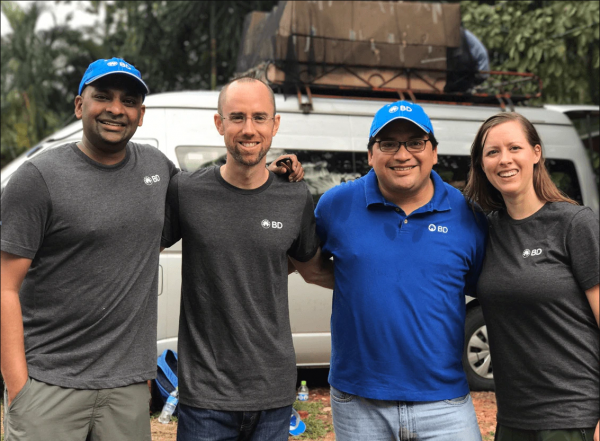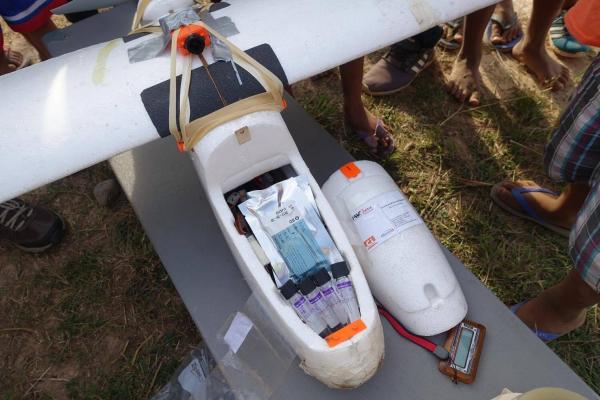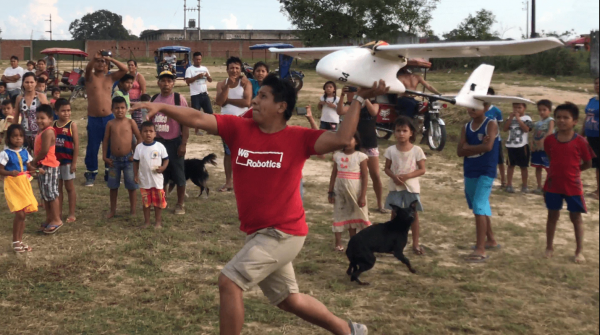BD and the international nonprofit WeRobotics recently completed a two-week study in the Peruvian Amazon testing Unmanned Aerial Vehicles (UAVs, commonly known as “drones”) for expanding healthcare access. The study was conducted to evaluate the use of UAVs to transport supplies and patient samples in areas with poor transportation infrastructure, a significant challenge in many countries.
In Peru specifically, weak transportation infrastructure frequently delays the transport of blood samples, causing sample degradation and making samples invalid for testing. Furthermore, barriers to personal travel and low personal incomes make access to testing locations a challenge for initial and follow-up testing.
The study in Peru focused on three elements: 1) gathering real-world data on the capabilities of autonomous UAVs for transporting supplies and patient samples, 2) evaluating the integration of UAVs into healthcare systems, and 3) testing the impact of UAV transport on CD4 testing of blood samples (CD4 level is a clinical indicator of HIV disease progression).
To gather data on the capabilities of UAVs for real-world healthcare applications, the teams tested multiple UAV platforms for range, payload capacity, and sensitivity to environmental factors such as weather and geography. They completed more than 40 autonomous flights over distances up to 126 km. Delivery of relevant BD healthcare supplies, including Vacutainer® tubes, FACSPresto™cartridges, BACTEC™ blood culture vials, BACTEC™ MGIT™ tubes, and SurePath™ sample collection vials, was demonstrated. Notably, UAV flights on all platforms were significantly faster and less expensive (for the quantities transported) when compared to traditional transportation methods such as boat or mototaxi.
To evaluate the integration of UAVs into the local healthcare system, the BD team visited seven healthcare facilities in communities along the Ucayali River, the main route of transport between communities in the study region. The visits focused on understanding the existing healthcare system, local health burdens, standards of patient testing and care, and unmet needs. The team found that, of every $1.00 spent on medications and supplies, ~$0.29 is spent on distribution costs. Additionally, rural hospitals often spend over 70% of their total budget on transportation costs because they must rely on expensive medical evacuations when the local clinic does not have the needed medicines or supplies to treat a patient. Personal travel also presents significant physical burdens and safety risks for both patients and healthcare providers. Patients, providers, and national health officials confirmed the need for better solutions and indicated a readiness to adopt UAV technology to improve access to supplies and lab testing services.
The BD team also tested the impact of UAV delivery on CD4 testing of blood samples using the BD FACSPresto™. Blood samples were procured from local blood banks (donors had passed prescreening assays for blood donation) and included on a subset of flights in order to evaluate the effect of UAV transport on subsequent CD4 testing on the FACSPresto™. Sample portions transported via UAV were shown to be statistically equivalent to non-flown sample portions for all metrics measured (CD4, %CD4, and hemoglobin).
Through the study, BD and WeRobotics demonstrated that UAVs can be used to effectively transport vital healthcare supplies and patient samples, addressing critical gaps and improving patient care. The outcomes of the Peru study and UAV delivery developments around the world suggest that UAVs can play a role in building more sustainable healthcare networks.
Effectively scaling the use of UAV technology for healthcare will require the participation of multiple parties, including government agencies, healthcare providers, UAV operators, and healthcare companies. BD is continuing to evaluate opportunities with partners to apply innovative technologies like UAVs to address unmet healthcare needs, fulfilling BD’s purpose of advancing the world of health.
Subscribe to receive BD blog alerts


